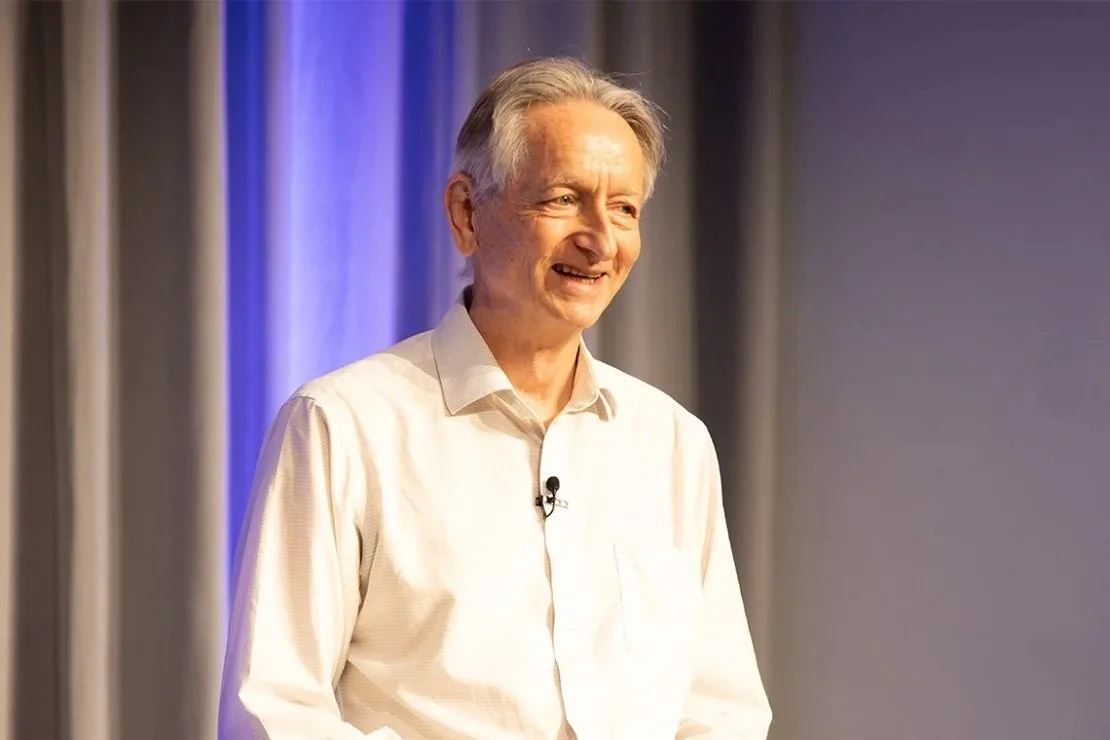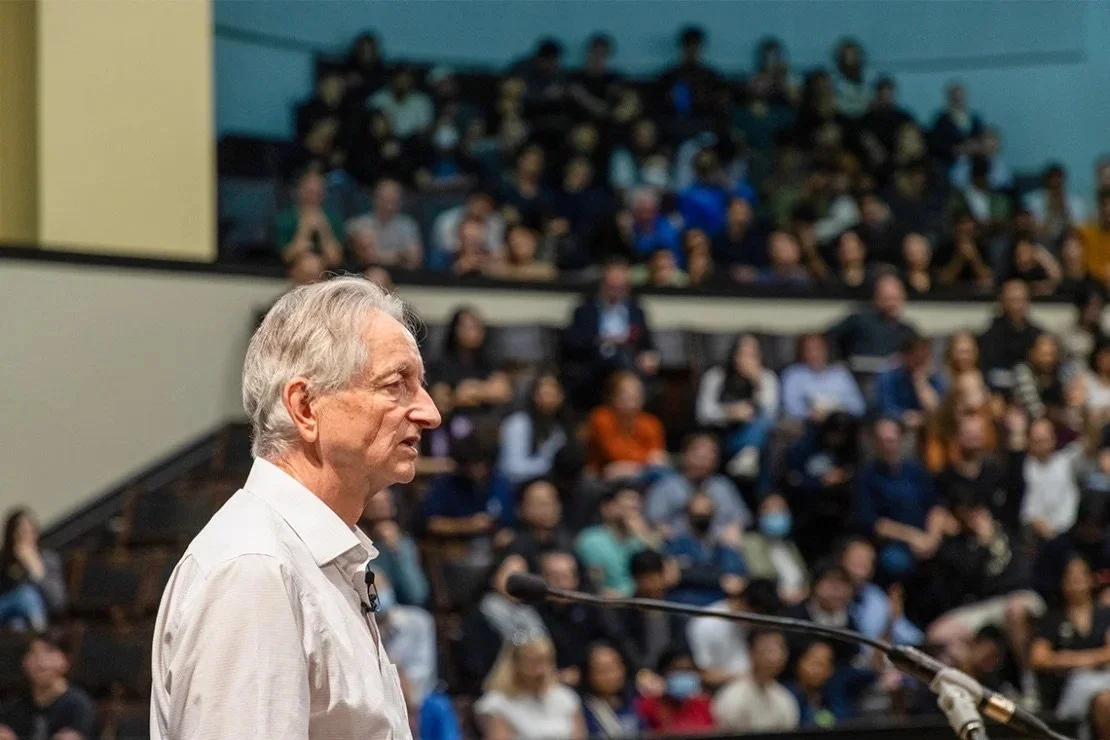The Dynamic Graphics Project lab hosted high school students for a weeklong immersion into graduate school life in one of the world’s top computer graphics and human-computer interaction labs.
Video game design course and showcase propel student creativity into the spotlight
Alumna Patricia Thaine turns passion for finding patterns in language into career in online privacy
‘We’re improving patient safety’: How one CS grad is using AI to personalize health-care operations
CS alum Alex Lu is discovering new ways to apply deep learning in biology
New faculty spotlight: Niv Dayan
New faculty spotlight: Qizhen Zhang
Achieving alignment: How U of T researchers are working to keep AI on track
New faculty spotlight: Gururaj Saileshwar
Reflecting on ‘Social Issues in Computing,’ 50 years later
Web3, here we come: CS alum and Agora co-founder Kent Fenwick on the future of the internet
Geoffrey Hinton tops Toronto Life's list of most influential people
Department of Computer Science welcomes its newest faculty members in 2023–2024
Get to know four recently hired faculty members, joining the Department of Computer Science throughout 2023 and 2024. Together with those whose arrival was announced in 2022, we extend a warm welcome to the newest members of our departmental community.
Aviad Levis
Assistant Professor
Joins July 1, 2024
Aviad Levis will join the Department of Computer Science in July 2024 as assistant professor. His work focuses on developing computational imaging tools for scientific discovery. After completing his PhD at the Technion in 2020, he joined Caltech as a postdoc working on imaging black holes with the Event Horizon Telescope. His research lies at the intersection of artificial intelligence and physics, working on interdisciplinary inverse problems in diverse fields, from astrophysics to climate.
Kuldeep Meel
Associate Professor
Joined July 1, 2023
Kuldeep Meel joined the Department of Computer Science in July 2023 as associate professor. Before moving to Toronto, he held NUS Presidential Young Professorship in the School of Computing at the National University of Singapore. His research interests lie at the intersection of formal methods and artificial intelligence. His research program's long-term vision is to advance automated reasoning techniques to enable computing to deal with increasingly uncertain real-world environments. His research program's recent recognition include the 2023 CACM Research Highlight Award, CAV-23 Distinguished Paper Award, DATE-23 Best Paper Award Nomination, 2022 ACM SIGMOD Research Highlight, 2022 ACP Early Career Researcher Award, and IJCAI-22 Early Career Spotlight.
Akshayaram Srinivasan
Assistant Professor
Joined July 1, 2023
Akshayaram Srinivasan joins the Department of Mathematical and Computational Sciences (University of Toronto Mississauga) as assistant professor. Before that, he was a reader at the Tata Institute of Fundamental Research, Mumbai. He received his PhD in Computer Science from the University of California, Berkeley. His research interests lie broadly in the theoretical foundations of Cryptography. His main focus is on constructing secure computation protocols that enable a set of parties to perform computation on their private inputs without leaking any other information. He is a recipient of the Google India Research Award (2022), and his research has been recognized with the best paper award at Eurocrypt 2018.
Roei Tell
Assistant Professor
Joined August 1, 2023
Roei Tell joined the Department of Computer and Mathematical Sciences (University of Toronto Scarborough) in August 2023 as an assistant professor. His research in theoretical computer science explores the limits of what algorithms can achieve efficiently, as part of a field called computational complexity theory. In recent years he has been studying new methods of simulating randomness for algorithms, and the implications of these methods on theoretical computer science (e.g., on understanding which problems are hard to solve, on designing interactive protocols for proving claims, and on building theoretically secure cryptographic systems). He completed his PhD at the Weizmann Institute of Science, and spent time as a postdoctoral researcher at MIT, at the Institute for Advanced Study and DIMACS, and as a fellow at Simons Institute for the Theory of Computing.
Graduation Spotlight: Evi Micha
Graduation Spotlight: Myles Thiessen
Graduation Spotlight: Helena Jovic
Graduation Spotlight: Parsa Tajik
Geoffrey Hinton fields questions from scholars, students during academic talk on responsible AI
CS alum Francois Gouelo is changing the status quo of the hospitality industry
Geoffrey Hinton to give scholarly talk on whether AI will eclipse human intelligence
Geoffrey Hinton will be giving an academic talk on artificial intelligence at Convocation Hall on Oct. 27. (Photo: Polina Teif)
After capturing the world’s attention with his warnings about the existential risks posed by rapid advancements in artificial intelligence, Geoffrey Hinton will be engaging directly with researchers and scholars at a University of Toronto event.
A U of T University Professor Emeritus in the Department of Computer Science who is often referred to as “the godfather of AI,” Hinton will tackle the question “Will digital intelligence replace biological intelligence?” during an academic talk at Convocation Hall on Oct. 27. (Tickets to the in-person event are sold out, but a recording will be shared publicly at a later date).
His lecture will be followed by a Q&A session co-ordinated by Sheila McIlraith, a professor in the Department of Computer Science in the Faculty of Arts & Science who is a Canada CIFAR AI Chair and an associate director at U of T’s Schwartz Reisman Institute for Technology and Society.
The session will give Hinton an opportunity to directly engage with researchers and scholars from across the university regarding the revolutionary technology he helped create.
“AI is re-shaping the way we live, work and interact with each other,” says McIlraith. “Given the current public discourse about AI, it’s particularly important that scholars across disciplines learn from each other and engage in an informed exchange of views regarding the societal implications of this transformative technology.”
U of T provides an ideal forum for such scholarly discourse, she adds, because of U of T’s historical role in the development of AI, the “breadth and depth” of expertise at the university and the city of Toronto’s position as a global hub of AI research and development.
"The conversation around AI is no longer housed in the computer science lab or within the offices of Big Tech. It needs to be multidisciplinary to advance our collective understanding of the opportunities and the potential risks so we can work to avoid the risks while benefiting from all that AI has to offer.”
The Schwartz Reisman Institute for Technology and Society and the department of computer science in the Faculty of Arts & Science are co-hosting Hinton’s talk in collaboration with the Vector Institute for Artificial Intelligence and the Cosmic Future Initiative at the Faculty of Arts & Science.
— Original story by Adina Bresge for U of T News























